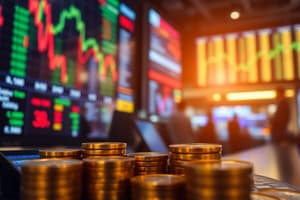Podcast
Questions and Answers
What is the primary function of the money market?
What is the primary function of the money market?
- To issue long-term securities
- To deal with short-term financing needs (correct)
- To invest in low liquidity assets
- To facilitate foreign exchange transactions
Which of the following instruments is NOT typically associated with the money market?
Which of the following instruments is NOT typically associated with the money market?
- Bonds with maturities over ten years (correct)
- Certificates of deposit
- Treasury bills
- Commercial papers
What type of monetary operations does the central bank conduct to achieve desired liquidity?
What type of monetary operations does the central bank conduct to achieve desired liquidity?
- Weekly investments in equity markets
- Daily monetary operations (correct)
- Daily reshuffling of bank reserves
- Monthly adjustments of interest rates
Which of the following is a primary funding instrument in the conventional money market?
Which of the following is a primary funding instrument in the conventional money market?
What is the primary role of a money market fund?
What is the primary role of a money market fund?
In the Islamic money market, what is the main instrument used by banks to influence liquidity?
In the Islamic money market, what is the main instrument used by banks to influence liquidity?
Which market is characterized by the trading of services such as futures and options?
Which market is characterized by the trading of services such as futures and options?
What distinguishes primary markets from secondary markets?
What distinguishes primary markets from secondary markets?
What is the main purpose of derivative instruments like forwards and options?
What is the main purpose of derivative instruments like forwards and options?
Which of the following accurately describes a future contract?
Which of the following accurately describes a future contract?
What is a key characteristic of options compared to futures?
What is a key characteristic of options compared to futures?
In a futures contract for 1000 tons of CPO commodity, what does the price of RM1900/ton signify?
In a futures contract for 1000 tons of CPO commodity, what does the price of RM1900/ton signify?
What is the primary function of the Qard acceptance in the Bank's liquidity management?
What is the primary function of the Qard acceptance in the Bank's liquidity management?
What is a common application of derivatives in financial markets?
What is a common application of derivatives in financial markets?
What does a call option allow the holder to do?
What does a call option allow the holder to do?
What underlying commodity is primarily used in the Commodity Murabahah Programme (CMP)?
What underlying commodity is primarily used in the Commodity Murabahah Programme (CMP)?
Which of the following options best describes the capital market?
Which of the following options best describes the capital market?
Which of the following statements correctly reflects the nature of swap contracts?
Which of the following statements correctly reflects the nature of swap contracts?
What financial instruments are typically traded in the debt market?
What financial instruments are typically traded in the debt market?
What type of risk do derivatives primarily help producers manage?
What type of risk do derivatives primarily help producers manage?
In the equity market, what do shareholders have the ability to do after purchasing securities?
In the equity market, what do shareholders have the ability to do after purchasing securities?
What is a key feature of the Islamic equity market in Malaysia?
What is a key feature of the Islamic equity market in Malaysia?
What is necessary for a product to be considered an Islamic equity product?
What is necessary for a product to be considered an Islamic equity product?
Which market does not represent the equity market?
Which market does not represent the equity market?
Which of the following characteristics defines the ACE Market?
Which of the following characteristics defines the ACE Market?
What is the primary focus of the primary market?
What is the primary focus of the primary market?
What is an IPO?
What is an IPO?
In which market do investors trade previously issued securities?
In which market do investors trade previously issued securities?
Which of the following statements about the Main Market is accurate?
Which of the following statements about the Main Market is accurate?
What role do underwriters play in the primary market during an IPO?
What role do underwriters play in the primary market during an IPO?
What is a key difference between the primary and secondary markets?
What is a key difference between the primary and secondary markets?
What does 'market capitalization' refer to in the context of the Main Market?
What does 'market capitalization' refer to in the context of the Main Market?
Flashcards
Money Market
Money Market
A market dealing with short-term debt securities with a maturity period of less than a year. These instruments are highly liquid and considered low-risk due to their short maturity.
Money Market Funds
Money Market Funds
Funds that invest in highly liquid, short-term debt instruments. They are considered a low-risk investment option due to their high liquidity and short maturity.
Daily Monetary Operations
Daily Monetary Operations
Central banks use these operations to manage the amount of liquidity in the banking system. This helps them achieve their monetary policy goals. Examples include buying or selling government securities.
Ringgit Interbank Money Market
Ringgit Interbank Money Market
Signup and view all the flashcards
Islamic Money Market
Islamic Money Market
Signup and view all the flashcards
Qard Acceptance
Qard Acceptance
Signup and view all the flashcards
Capital Market
Capital Market
Signup and view all the flashcards
Primary and Secondary Markets
Primary and Secondary Markets
Signup and view all the flashcards
Debt Market
Debt Market
Signup and view all the flashcards
Equity Market
Equity Market
Signup and view all the flashcards
Islamic Equity Market
Islamic Equity Market
Signup and view all the flashcards
Liquidity Management for Banks
Liquidity Management for Banks
Signup and view all the flashcards
Commodity Murabahah Programme (CMP)
Commodity Murabahah Programme (CMP)
Signup and view all the flashcards
Medium to Long Term Financial Assets
Medium to Long Term Financial Assets
Signup and view all the flashcards
Bursa Malaysia - Shariah Compliant Stocks
Bursa Malaysia - Shariah Compliant Stocks
Signup and view all the flashcards
Requirements for Islamic Equity Products
Requirements for Islamic Equity Products
Signup and view all the flashcards
Primary Market
Primary Market
Signup and view all the flashcards
Secondary Market
Secondary Market
Signup and view all the flashcards
Main Market
Main Market
Signup and view all the flashcards
ACE Market
ACE Market
Signup and view all the flashcards
IPO
IPO
Signup and view all the flashcards
Secondary Market Trading
Secondary Market Trading
Signup and view all the flashcards
Underlying Instrument (Islamic Finance)
Underlying Instrument (Islamic Finance)
Signup and view all the flashcards
Shariah Compliance in Equity Products
Shariah Compliance in Equity Products
Signup and view all the flashcards
Forward Contract
Forward Contract
Signup and view all the flashcards
Futures Contract
Futures Contract
Signup and view all the flashcards
Option Contract
Option Contract
Signup and view all the flashcards
Swap Contract
Swap Contract
Signup and view all the flashcards
Forward Contract (Commodity)
Forward Contract (Commodity)
Signup and view all the flashcards
Futures Contract (Commodity)
Futures Contract (Commodity)
Signup and view all the flashcards
Option Contract (Commodity)
Option Contract (Commodity)
Signup and view all the flashcards
Swap Contract (Commodity)
Swap Contract (Commodity)
Signup and view all the flashcards
Study Notes
Market Structure and Classifications
- This chapter covers market structures and classifications, including money markets, capital markets (debt and equity markets, primary and secondary markets), and forward, future, and options markets.
- Different types of markets exist for various financial instruments with distinct characteristics and functions.
3.1 Money Market
- The money market deals with short-term financial instruments with maturities of one year or less.
- Money market funds invest in highly liquid instruments equivalent to cash.
- Banks use money markets to balance daily deposit shortfalls by buying money market instruments.
- The transactions involve lending money from banks to other participants to bolster the necessary funds for banks to effectively render short-term lending.
- Money market instruments are considered low risk due to their high liquidity and short-term nature, mainly supported by banks.
- Islamic money market operations are conducted by central banks to maintain desired liquidity in the banking system via approved interbank institutions.
3.2 Capital Market
- The capital market deals with medium to long-term financial assets such as corporate stocks, public and private debt securities, and shares with no fixed maturity.
- It encompasses trading in the stock market, government bond market, and private debt securities marketplaces.
3.2.1 Debt and Equity Market
- Debt Market: This market allows companies and governments to raise long-term funds through debt securities, including private placements and organized exchanges.
- Debt instruments include bonds, sukuk (Islamic bonds), and other loans, which typically pay interest.
- Equity Market: This market facilitates the buying and selling of securities, shares, and other exchange-traded instruments. Investors can sell shares they own for a profit after buying them.
- In an Islamic equity market, funds transfer from surplus to deficit units while adhering to Sharia principles.
3.2.2 Primary and Secondary Markets
- Primary Market: Companies/governments issue securities for the first time, and investors directly buy the securities from the issuing entity.
- Example: Initial public offering (IPO)
- Secondary Market: Investors buy and sell previously issued securities, with no involvement of the issuing entity.
3.2.3 Forward, Future, and Options Market
- Forward Market: An agreement between two parties to buy or sell an asset at a future date at a predetermined price.
- Future Market: Standardized contracts traded on a futures exchange for buying or selling an underlying instrument on a designated future date.
- Options Market: Financial instruments that offer the right, but not the obligation, to buy or sell an underlying asset at a specific price and date. This right can be exercised at the holder's discretion.
Studying That Suits You
Use AI to generate personalized quizzes and flashcards to suit your learning preferences.




